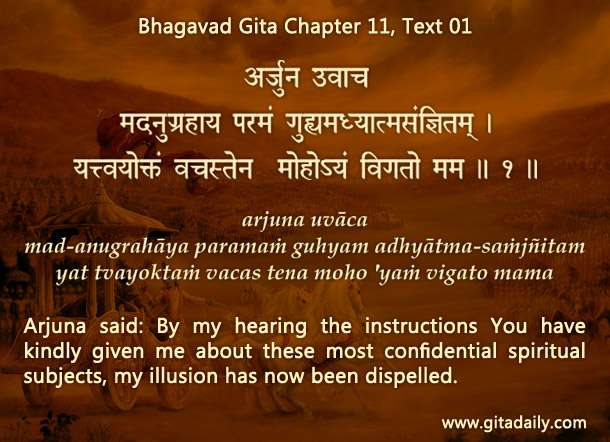
Miracles are integral to the lore of the world’s religions. God’s miraculous interventions to protect his beleaguered devotees bolster the faith of not just those devotees but also many subsequent generations of devotees. In the Mahabharata, for example, Krishna intervenes on several occasions to protect the virtuous Pandavas.
Yet just before the climactic Kurukshetra war, when Arjuna breaks down at the prospect of fratricidal bloodshed, Krishna doesn’t resort to miraculous displays of his power to reinstate Arjuna in his duty. Far from it, Krishna goes into a rigorous philosophical discussion about the nature and purpose of existence – a discussion centered on dharma, the role of the individual, the soul, within the whole, Krishna. This profound education thoroughly removes Arjuna’s illusions, as he informs at the start of the eleventh chapter (11.01).
Only after that, as a supplementary demonstration of Krishna’s supremacy, Arjuna requests him to display his universal form. The resulting theophany, a supernatural vision in which Krishna displays his astonishing, awe-inspiring, all-pervading form, is one of the greatest mystical revelations in world religion.
But significantly after this revelation both Arjuna and Krishna return back to serious philosophical discussion that continues over the next six chapters. Towards the Gita’s conclusion, Krishna doesn’t ask for faith in him based on his miraculous revelations. Instead, he asks (18.63) for due deliberation on his message.
Nor does Arjuna state that his faith in Krishna is based on that revelation. Before the display of the Universal Form, Arjuna has already expressed his faith in the tenth chapter (10.12 – 10.15) after hearing the profound philosophical wisdom of the Gita, especially its four-verse essence (Chatur-shloki Gita 10.08 – 10.11).
Thus, the Gita through Arjuna’s example instructs seekers to build their faith not by giving undue importance to miracles but by giving due importance to philosophical wisdom.
Explanation of article:


Hare Krishna Prabhuji!
You have highlighted very subtle points that we overlook during our study of the Gita.
We often put our faith in Krishna after His revelation of the cosmic form. Whereas, Arjuna expresses his faith in Krishna even before the Visva-rupa darshan.
You have taught us to put our faith based on not only just mystic revelation but also philosophical wisdom.
Thank you very much Prabhuji for sharing the article.